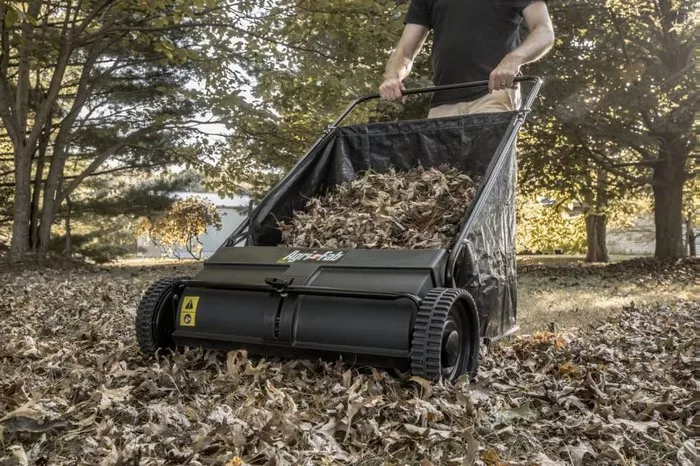Maintaining a pristine lawn often involves more than just mowing the grass. Debris like rocks, twigs, and leaves can accumulate and detract from the overall appearance of your yard. While raking is a traditional method for clearing debris, a lawn sweeper offers a more efficient solution. But can a lawn sweeper effectively pick up rocks? This comprehensive guide will delve into the capabilities of lawn sweepers and provide tips on how to use them to tackle rocks and other debris effectively.
Understanding Lawn Sweepers
Before discussing their efficacy in picking up rocks, it’s essential to understand what a lawn sweeper is and how it operates. A lawn sweeper is a yard maintenance tool designed to clear debris from the lawn’s surface. It consists of a rotating brush mechanism attached to a wheeled frame. As the sweeper is pushed or pulled across the lawn, the brushes collect debris and deposit it into a hopper or bag for later disposal.
Can a Lawn Sweeper Pick Up Rocks?
The primary function of a lawn sweeper is to collect light to moderate debris such as leaves, grass clippings, and small twigs. While most lawn sweepers are not specifically designed to pick up rocks, they can effectively handle smaller stones and pebbles. However, larger rocks may pose a challenge and could potentially damage the sweeper’s components.
Factors Affecting Rock Pickup
Several factors influence a lawn sweeper’s ability to pick up rocks:
1. Brush Height: Adjusting the brush height on the sweeper can impact its ability to collect rocks. Lowering the brush closer to the ground increases the likelihood of picking up smaller rocks.
2. Brush Stiffness: Stiffer brushes are more effective at dislodging and collecting rocks from the lawn’s surface. Consider the brush material and stiffness when selecting a lawn sweeper.
3. Speed and Direction: Moving the lawn sweeper at a moderate speed in a consistent direction improves debris collection, including rocks. Avoid abrupt turns or changes in speed, which may cause rocks to scatter.
Tips for Using a Lawn Sweeper to Pick Up Rocks
While lawn sweepers may not be specifically designed for rock removal, the following tips can enhance their effectiveness in clearing stones from your lawn:
1. Inspect the Lawn: Before using the sweeper, walk around the lawn to identify and remove any large rocks or debris that could potentially damage the sweeper or impede its operation.
2. Adjust Settings: Experiment with different brush heights and angles to optimize the sweeper’s performance for rock pickup. Start with a higher setting and gradually lower it until you achieve satisfactory results.
3. Clearing Path: Divide the lawn into manageable sections and systematically sweep each area, overlapping slightly to ensure thorough coverage. Clear the hopper or bag regularly to prevent clogging and maintain optimal suction.
4. Regular Maintenance: Keep the lawn sweeper clean and free of debris buildup to maintain its efficiency. Check for any signs of wear or damage, particularly to the brushes and collection mechanism, and address any issues promptly.
Conclusion
While lawn sweepers are primarily designed for collecting leaves and grass clippings, they can be effective at picking up smaller rocks and debris from the lawn’s surface. By adjusting settings, practicing proper technique, and conducting regular maintenance, you can maximize a lawn sweeper’s performance for rock removal. However, it’s essential to exercise caution when using a sweeper near larger rocks to avoid damage to the equipment. With proper care and attention, a lawn sweeper can be a valuable tool in maintaining a clean and debris-free lawn.
FAQs
Q1. Can a lawn sweeper pick up large rocks?
A1: A lawn sweeper is not designed to handle large rocks effectively and attempting to pick up substantial stones could damage the equipment. It’s best to manually remove large rocks from the lawn before using a sweeper to prevent damage and ensure optimal performance.
Q2. How often should I empty the hopper or bag while using a lawn sweeper?
A2: The frequency of emptying the hopper or bag depends on the amount of debris present in your lawn. As a general rule, it’s advisable to empty the hopper or bag regularly to prevent clogging and maintain efficient suction. Check the hopper or bag periodically while sweeping and empty it as needed to ensure uninterrupted operation.
Q3. Can a lawn sweeper be used on uneven terrain with rocks?
A3: While lawn sweepers are suitable for use on relatively flat and even terrain, they may struggle on rough or uneven surfaces with rocks. Rocks could potentially damage the sweeper’s brushes or other components, and the uneven terrain may impede its ability to collect debris effectively. Exercise caution when using a lawn sweeper on rocky terrain and consider manually removing larger rocks before sweeping for optimal results.

